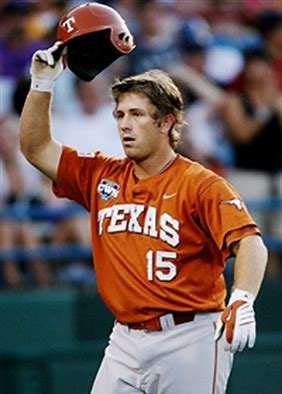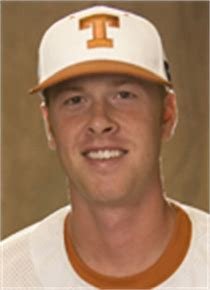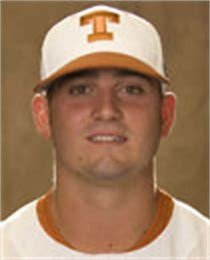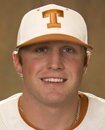THE MAGICAL 2009 TEAM - RUNNER UP IN THE CWS BUT A CHAMPION IN THE HEARTS OF FANS WITH A 50-16-1 RECORD
Started the season with 11 wins. The Horns won their 4th consecutive Big 12 Championship. Texas was the top seed in the NCAA tournament losing to LSU in the finals.
AUSTIN WOOD SETS A TEXAS CAREER RECORD OF 118 APPEARANCES.
A team that started as the Bad News Bears (not a compliment) morphed to what Augie says is his best "small ball" team ever. Every member of the starting lineup had at least 6 sacrifice bunts. The players were unified in the strategy needed to win. The 2009 team’s success confounded sportswriters. It was a team that did not win with averages and percentages but with a spiritual bond and a sense of destiny. The team ranked 210th in home runs with a batting average next to last in the Big 12. This team only won the conference championship because the opposing team had a plane to catch. Augie says with humor that the Longhorns had discovered divine intervention from the "Church of Baseball. "This team did what they needed to do to win- "walk, sacrifice, homers, small ball, long ball, bunts, balks, and acts of nature" A team that was "offensively challenge" was winning on "pitching and magic" This team should be presented with the record for most "improbable wins."
May 30, 2009, Boston College and UT played the longest game in college baseball history. The game lasted 25 innings and 7 hours and 3 minutes. Austin Wood threw 13 scoreless innings in relief, and the opposing team players stood and clapped for his performance.
Austin Woods breaks Harvie Haddix’s record by throwing 13 perfect innings against Boston College but did not win to show for his effort. Wood left the game in the 20th inning after his 169th pitch.
Augie says that Travis Tucker is one of the best hitters and a true leader for the 2009 team. According to Coach Keith Shinaberry, Travis was a free spirit and a natural leader. Travis suggested to coach Garrido that his coaching style was too complicated and asked Coach to keep the game simpler. Coach Garrido did as instructed, and the team started to win.
Russell Moldenhauer is benched early in the season because of a batting slump and an injury. He is then promoted to clean-up hitter during the CWS game against Southern Miss. He delivers 4 home runs during the CWS. Augie said this team of 2009 " not only defied explanations, but they also defied natural law."
Even though this team finished runner-up, Coach Garrido knew this team would receive more adulation than most teams who lose. The Horn fans treated this team as the greatest non-champion of all time.
Bill Little said this team was loved because of "who they became, and the fact that they took us all along for the ride." "They were totally human, and absolutely fun" to watch.
Bill Little commentary: NCAA Regional chronicles -- Last man standing June 1, 2009
Preston Clark
Bill Little, Texas Media Relations
It is hard, if not darn near impossible, to be all alone in a crowd.
And yet there Preston Clark stood, watching with the rest of the baseball world in Austin, as his line drive to left field battled to defy nature, to somehow best a 25-mile-per-hour wind that seemed determined to blow it foul.
Close to 14,000 eyes were watching the ball, including those of the three Texas runners on base who had somehow produced a 10-10 tie out of a four-run deficit heading into the ninth inning of the NCAA's Austin Regional Championship game against Army.
Frozen just a few feet from home plate, locked in his dreams, was Preston Clark.
The road for the senior from Rockwall had been as tough as it has been for any Longhorn ever. He had come to Texas as a highly touted catching prospect in 2005, the heir-apparent to Taylor Teagarden, the Longhorns' all-American catcher who would be spending time in the Big Leagues in just three years. He is the only remaining Longhorn who was a member of that 2005 National Championship team. He has pride in being a member of that team, but doesn't take ownership of the title, since he wasn't on the suit up squad for the CWS. His National Championship ring, with all of its glitter, is put safely away.
Two shoulder surgeries, a costly knee injury just before the regional in 2007 and more work and rehabilitation coming into this year had relegated him to utility work, and a lot of bench time. And yet at Oklahoma City in the Big 12 Tournament, he had homered. The long missing stroke with the bat was back. Still, with sophomore Cameron Rupp playing well behind the plate, Preston was searching for a place in the lineup.
The guy once heralded as a "can't miss" super star even moved quietly into the 2009 Austin Regional, inserted in the lineup in the Longhorns' opening game against Army as the designated hitter-a right-handed batter in the fifth spot of the lineup against a left-handed pitcher. But-and you have heard this before-playoffs do make strange heroes, and Preston Clark's regional run was only beginning.
First, Brandon Belt was hit by a pitch, knocking the Longhorn first baseman out of the game in the first inning. So Clark, the designated hitter, moved to first base, where he played superb defensively, while collecting two hits and scoring two runs. In the 25-inning game against Boston College, he started at first base, had four hits and scored one of the runs in Texas's 3-2 victory.
From the beginning of the tournament, Army coach Joe Sottolano had warned that his team, which batted .334 over a 53 game regular season-could hit. He also made it very clear. Army had not come to the NCAA Regional as a fourth seed with expectations of a nice visit to Austin and a box of "you were here" medals.
"It is not our nature," he had said, and his steel eyes and those of his players made you know he meant what he said.
Augie Garrido has often said that baseball is a game of the unexpected, and this 2009 Austin Regional proved to be that for many of the so-called analysts who at one point called it the easiest of the 16 regionals. It was, without question, the best balanced, and the most competitive, of all of the many regionals held in Austin since the first was held at what was then Disch-Falk Field in the summer of 1979. Any of the four teams could have won it. Texas State went out first, suffering two late losses to Boston College, 8-7, and Army, 7-4.
Boston College had rallied to beat the Bobcats, and then became part of that 25-inning game in a 3-2 loss to Texas. The tournament ended in heartbreak for Coach Mik Aoki's Eagles in a 4-3 loss to Army, with the tying run at third base and heading home when the first base umpire rang out the BC runner on a double play-and video replays showed the runner was safe.
No team, however, has ever visited an Austin Regional and commanded more respect and captured more hearts than did the Black Knights of the Hudson. Garrido would say at the end of the day that baseball was "spiritual." Perhaps so, because there was a unique spirit in the entire tournament. This was a four-team field of really good college baseball teams in which there were no bad guys. At the end of the BC-Texas marathon, the teams embraced. At the end of the tournament, the UFCU-Disch Falk Field crowd gave one of its best applauses ever to the men of Army.
Most times, the team that comes out of the afternoon game in a four-team regional will come into the evening session and run out of gas about the sixth inning. But not Army. It was not, as their coach had said, "in their nature." The Black Knights pounded Texas starter Taylor Jungmann for six earned runs and chased him from the game after three and a third innings. When Kevin Keyes ignited the 'Horns and the crowd with a two run homer to cut Army's lead to 7-6 in the seventh inning, it appeared the momentum had swung. Instead, Army swung. A two run home run by stellar sophomore shortstop Clint Moore and booming shot over the centerfield "Green Monster" by 6-7, 250 pound Joey Henshaw (he, too is a sophomore) gave Army a 10-6 lead with only two innings remaining in what was now being viewed as the region's "first Championship Game." If Army won, the two would play again on Monday.
The focus of the weekend, to that point for Texas, had been the dramatics of the Saturday night winner's bracket game with Boston College. The two teams had played more innings (25) and for a longer time (just over seven hours) than anybody in NCAA history. Texas closer Austin Wood had achieved immortality in Longhorn lore by pitching 13 innings in relief, including more than 12 before yielding a hit. He was matched on the other side by Boston College reliever Mike Belfiore, who shut out Texas for nine and two thirds innings himself.
Mack Brown has a saying when qualifying something that is really good, and it's "I won't say it is the best, but I will say no one has anything better."
So it was with Wood's truly remarkable performance. He threw 169 pitches and basically pitched more than 12 innings of no-hit baseball. Old timers at Texas will tell you how Bobby Layne pitched a no-hitter at Texas A&M to claim the Southwest Conference title while nursing a cut foot and a dozen cold beers. The "gold standard" for Texas pitching masterpieces prior to Saturday night was thrown by Burt Hooton during his junior season in an SWC showdown against Texas Tech. Hooton, who was credited with a no-hitter by pitching a perfect game over the regularly schedule contest, defeated the Raiders' Reuben Garcia, 1-0, in a 13-inning game many claim was the best pitched game ever in the SWC. Hooton didn't walk a batter, wound up allowing one hit (the batter was retired on a double play), struck out 19, and faced the minimum 39 batters.
Now, here on a surprisingly still late May Saturday night, Austin Wood matched Hooton's 13 innings, but he did it all in relief. And what sets this one apart is that he did it in a game of sudden death. From the bottom of the ninth inning until he was replaced by Austin Dicharry in the 20th inning, Wood played Russian roulette with Boston College's bullets. One run, however it came, and it was over. And as the evening wore to morning, both teams realized that the goal of winning the regional was getting dimmer and dimmer for the team which finally lost the contest.
Mik Aoki knew it, even as he regrouped his club for the game against Army which began less than eleven hours after the 25-inning game was over. Still, the Eagles were in the game with the Cadets to the very last second.
When the final press conference was over, Joe Sottolano's voice almost broke as he talked about his team. The Black Knights had taken an early lead over Texas, and dominated the game until the fateful ninth inning. Keyes had provided the big blow, but time after time, the Longhorns were thwarted by good pitching and outstanding defense. Moore, the young shortstop, made an unbelievable play to throw out Travis Tucker from deep in the hole. Andy Ernesto's diving catch had taken runs and an extra base hit away in centerfield, and Kyle Fleming went to the right field wall to haul in Brandon Belt's bases loaded blast that ended the sixth inning.
"When we came here," Sottolano said, "our team has been given courtesy and respect because of the name on the front of our jerseys." He looked over at Moore, and Ernesto-a senior who will be leaving to become a helicopter pilot-and said softly, "what I would like them to be remembered for is being very good baseball players."
Preston Clark stood at home plate, awash in the dream of every player who ever picked up a bat or threw a ball. It is that moment of the spirit, when time stops, and the world is in freeze frame. Folks down the left side of the ball park looked at the third base umpire, who thrust his arm toward the field. Preston Clark raised his hands, and started to first base.
"When," they asked Joe Sottolano, "did you believe your team was in trouble?"
"When the grand slam happened," he said. "Until then, we have enough confidence in ourselves and in our team to believe we had a chance. It is not in our nature to do anything else."
What happened at UFCU Disch-Falk Field Saturday night and early Sunday morning was historical. The record will show it was the longest game in school history, and in NCAA history. Individual records were set, and they will all be dutifully recorded in the annals of time.
But what happened on Sunday night and throughout the tournament was memorable. It is the essence of sport that you remember the moment. It is then that iPhones and digital cameras give way to the pictures that hang on the hallways of the chambers of the mind. Because the wonders of technology are proven and true, but they can never capture one thing: A feeling.
That is the pride Joe Sottolano felt as he looked the young men he had recruited to come play baseball and become American soldiers at The United States Military Academy, a similar kind of pride that Augie Garrido has felt in watching young men grow, year after year as the winningest coach in the history of the game.
Most of all, it is about Preston Clark, and all those like him who have battled adversity.
It is, once again, about waking up knowing who you are, and going out and realizing who you can be. And that is the best dream of all.





